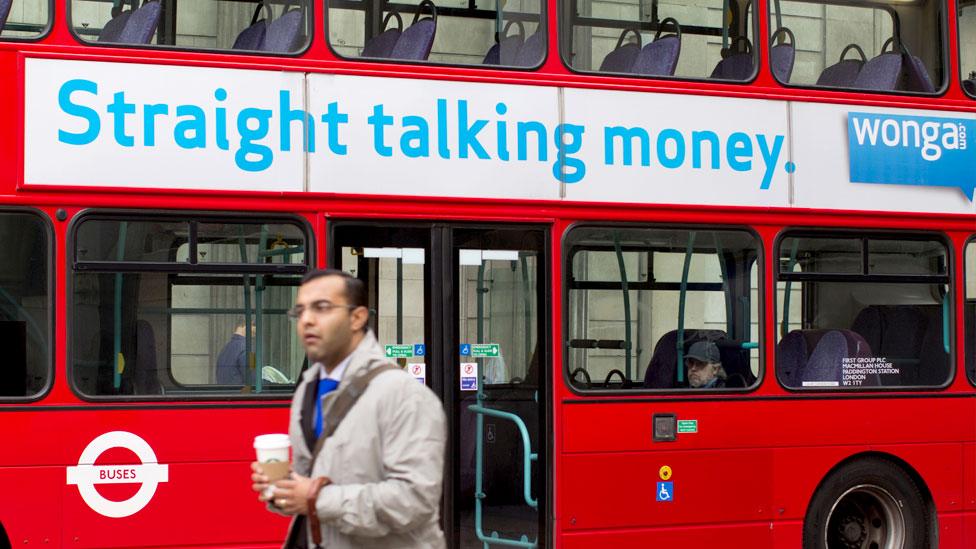'The Bank of Mum and Dad will run dry'
- Published

A mock funeral procession was held as a marketing gimmick after Wonga collapsed
Families will be unable to provide the extra financial support needed by their loved ones if lending from credit firms is choked off, a trade body has warned.
The Consumer Credit Trade Association said its members were under pressure having been "carpet bombed" with compensation demands from claims firms.
Less lending would mean people turned instead to family for loans, it said.
But claims companies say that lenders would not be in trouble if they had treated customers fairly in the past.
When payday lender Wonga collapsed into administration at the end of August, it blamed the surge in compensation claims over legacy loans for its demise.
The industry said at the time that claims management companies (CMCs) had "weaponised volume" by dropping hundreds of demands for compensation at the door. These claims suggested that lenders had never properly checked their customers could afford to pay the loans back.
Now Greg Stevens, chief executive of the Consumer Credit Trade Association, which represents 250 lenders, has claimed that other firms are being unfairly targeted by CMCs.
The result, he argued, would be increased costs for lenders, fewer loans available to consumers, and higher charges for those loans. He warned that lenders could pull out of the market, which is already a third of the size it was was in 2013. Instead, people would increasingly turn to their family for financial support, he said.
"We are not looking for sympathy, we are looking for fair play," he said.
"Regulation is too pro-consumer. They do not see the impact on the industry until it is too late."
Borrowers had already been forced to ask for help from family and friends, he said, and there was likely to be rising use of loan sharks. The Financial Conduct Authority's Financial Lives, external survey revealed that 3.6 million people (7% of UK adults) are borrowing from friends and family; that is more than the 3.1 million (6% of UK adults) who took out high-cost credit such as payday loans.
"Sooner or later the Bank of Mum and Dad runs dry," Mr Stevens said.

He reeled out a list of concerns held by the credit industry in the current Wonga-collapse climate, including:
A "reverse burden of proof" during claims that meant firms must prove to the ombudsman that they carried out suitable affordability checks with old loans, rather than consumers proving that checks did not take place. Cases that go to the ombudsman cost lenders £550 irrespective of the outcome, even though the average short-term loan was usually less than that
Banks offering overdrafts did not face the same rules on affordability that credit companies did with loans
The financial ombudsman was allowing claims linked to loans that were too far in the past, and should have been timed out
Claims management companies were trying to dodge regulation by city watchdog, the Financial Conduct Authority (FCA) by claiming they were under the same jurisdiction as solicitors
He argued that CMCs were also sending out a flood of claims before regulation under the City watchdog took effect next year.
But he admitted there was little that firms could do in the meantime to protect themselves from these claims and that they would "never get sympathy".
The list of gripes was refuted as sour grapes by Nick Baxter, an independent banking consultant and former chairman of the CMC's trade body, the Professional Financial Claims Association.
"The way to eliminate CMCs and claims is to treat consumers fairly, and get the sale right in the first place," he said, arguing that credit firms were responsible for their own lending practices.
Claims were often complicated and required research, he said, so it would be difficult to drop them all on a company at once. He added that it "would be hard for a CMC to avoid regulation by pretending to be something else".
Time out
The Financial Ombudsman Service said that each case was considered on its merits, but there was guidance on when a claim would be regarded as too old to be considered.
In general, a consumer can make a claim for compensation up to six years after the loan was sold.
However, they can also make a claim regarding a more historic loan, up to three years after they knew, or could reasonably have known, that they had good reason to make the complaint.
The three-year rule is a source of debate. Credit firms say the ombudsman is leaning too much in favour of claimants in allowing claims, with firms no longer having the documentation from such a long time ago. Others argue that there is no excuse for failing to keep the records for longer.


Wonga ended its sponsorship of Newcastle United in 2016
I have a Wonga loan, will this be written off?
Unfortunately for you, the repayments will still have to be made.
Although this will be overseen by the administrators - in the short-term at least - there is no practical difference in the way that these payments are made.
A service will continue for anyone who needs help, and anyone struggling to repay can still get in touch, and can also contact debt charities such as Citizens Advice or StepChange for free advice.
- Published30 August 2018

- Published31 August 2018

- Published30 August 2018

- Published27 August 2018

- Published30 August 2018
